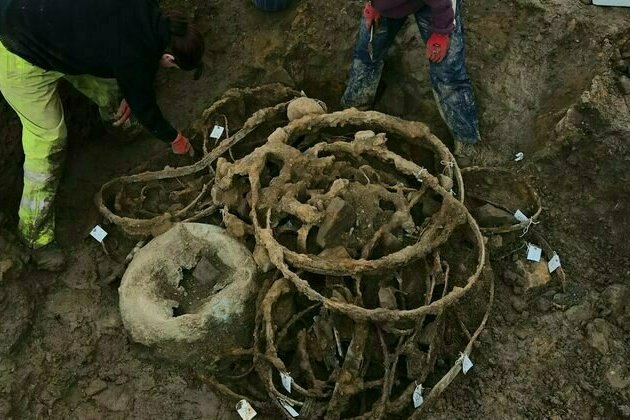Melsonby hoard: iron-age Yorkshire discovery reveals ancient Britons' connections with Europe
The Conversation
27 Mar 2025, 17:08 GMT+10

The Melsonby hoard is a remarkable collection of more than 800 iron-age metal artefacts, which was found in a field near Melsonby, North Yorkshire, in December 2021.
Its discovery represents a triumph of cross-sector collaboration in British archaeology. This extraordinary find excavated from Yorkshire soil is not just a collection of ancient objects, but signals a need for a significant revision of how we understand iron-age Britain.
The presence of materials imported from the Mediterranean, and a type of continental European wagon new to Britain, challenges the idea that iron-age Britons were isolated. Instead, it tell us that "wealthy" iron-age people in northern England had contacts extending out across Europe.
This 2022 excavation, supported by a Pound 120,000 grant from Historic England and expertise from the British Museum, revealed more than 800 items dating to the first century BC - around the time of the Roman conquest under Emperor Claudius. The objects are almost certainly associated with the Brigantes tribe who dominated northern England during this period.
Looking for something good? Cut through the noise with a carefully curated selection of the latest releases, live events and exhibitions, straight to your inbox every fortnight, on Fridays. Sign up here.
The scale of this discovery sets it apart from typical iron-age finds. The hoard includes partial remains of at least seven four-wheeled wagons and/or two-wheeled chariots, harnesses for at least 14 horses, 28 iron tyres (many deliberately bent), three ceremonial spears and two ornate cauldrons.
In iron-age Britain, communities regularly placed metalwork in rivers and bogs to mark significant life events, including death. The Thames has yielded deliberately deposited human skulls alongside weapons and metal objects. The Melsonby hoard can be seen as a land-based equivalent of these water deposits.
One of the most significant aspects of this discovery is the first evidence of four-wheeled wagons used by iron-age British tribes, possibly imitating vehicles seen in continental Europe. This finding suggests that northern Britain was far from isolated, instead participating in widespread networks spanning Europe to the Mediterranean.
The craftsmanship displayed in the hoard as whole is exceptional. Some horse harnesses feature Mediterranean coral and coloured glass, showcasing the distinctive curving patterns typical of Celtic Art. One cauldron, likely used for mixing wine, combines Mediterranean and iron age artistic styles - concrete evidence of cultural exchange between Britain and continental Europe.
Particularly intriguing is evidence that many items were deliberately burned or broken before burial. This practice of ritually "killing" valuable objects has deep roots in British prehistory, stretching back to the bronze age. By destroying such items, iron age elites may have been demonstrating their wealth and status through conspicuous consumption.
However, the burning might also relate to funerary practices in some way. Though no human remains were found, the objects could have been burned on a funeral pyre in a cremation ritual. This places the Melsonby hoard in an interesting position between traditional archaeological categories. It is part "hoard" (a deliberate deposit of objects) and part "grave goods" (items placed with the dead).
This dual nature isn't without precedent. Chariot burials are well-documented in iron-age Yorkshire, while collections of horse equipment appear in other discovered hoards. The Melsonby find might represent a combination of these traditions.
However, we wouldn't know about any of this if it hadn't been for the decision of metal detectorist Peter Heads to resist unearthing the hoard himself.
On making the discovery in December 2021, Heads immediately contacted archaeologists at Durham University, setting in motion a textbook example of proper archaeological practice. This allowed crucial contextual information that would have been lost forever had the site been disturbed without professional supervision.
The hoard's objects were carefully identified using scanning technology at the University of Southampton, allowing archaeologists to excavate without causing damage. This meticulous approach will enable years of productive research into these artefacts.
Valued at Pound 254,000, the Melsonby hoard is now the subject of a fundraising campaign by the Yorkshire Museum. A selection of objects is already on display, giving the public access to these remarkable artefacts.
As research continues on this extraordinary find, it stands as a powerful example of how proper archaeological practice - from responsible metal detecting to collaborative, well-funded excavation - can transform our understanding of Britain's past.
The Melsonby hoard offers a unique window into iron-age life in Britain, challenging long-held historical assumptions about regional development and cultural sophistication.
 Share
Share
 Tweet
Tweet
 Share
Share
 Flip
Flip
 Email
Email
Watch latest videos
Subscribe and Follow
Get a daily dose of Bristol Star news through our daily email, its complimentary and keeps you fully up to date with world and business news as well.
News RELEASES
Publish news of your business, community or sports group, personnel appointments, major event and more by submitting a news release to Bristol Star.
More InformationUnited Kingdom
SectionStories set in Chennai, Mumbai part of Salman Rushdie's new fiction since his stabbing
New Delhi [India], March 27 (ANI): Indian-born British and American novelist Salman Rushdie's new collection of stories is set to be...
Economic Watch: Trump's sweeping auto tariffs trigger strong global backlash
People test-drive a vehicle during a media preview of the 2024 Los Angeles Auto Show in Los Angeles, California, the United States,...
African state tightens entry rules for US citizens
Washington has said that from April 1, its passport holders will no longer be able to visit Namibia without obtaining visa US nationals...
Inspired by India, Pret A Manger unveils its first-ever full-service dine-in store globally
Pune (Maharashtra) [India], March 27 (ANI): There's good news for all food lovers out there in Pune as Pret A Manger has launched its...
Melsonby hoard: iron-age Yorkshire discovery reveals ancient Britons' connections with Europe
The Melsonby hoard is a remarkable collection of more than 800 iron-age metal artefacts, which was found in a field near Melsonby,...
The US has the power to switch off the UK's nuclear subs - a big problem as Donald Trump becomes an unreliable partner
Prime Minister Keir Starmer recently boarded one of the UK's four nuclear-armed submarines for a photo call as part of his attempts...
International
SectionFlorida City to train local police for immigration enforcement
WEST PALM BEACH, Florida: City officials in Fort Myers, Florida, voted last week to approve a new agreement allowing local police to...
US unveils plan to modernize air traffic control amid safety concerns
WASHINGTON, D.C.: With flight delays rising and aviation safety under scrutiny, the U.S. government is preparing a sweeping modernization...
NTSB calls for urgent safety checks on 68 US bridges, including icons
WASHINGTON, D.C.: The U.S. National Transportation Safety Board (NTSB) has called for urgent safety checks on 68 bridges, including...
US expands oil, gas leasing and eases Alaska energy restrictions
WASHINGTON, D.C.: U.S. Interior Secretary Doug Burgum has announced plans to open more land for oil and gas drilling in Alaska and...
Lawmakers push for fewer military flights in Washington D.C. area
WASHINGTON, D.C.: Ten Democratic lawmakers in the U.S. House of Representatives have asked the Pentagon to reduce military training...
Delta crash-landing probe finds dangerous descent before touchdown
TORONTO, Canada: An initial investigation into last month's dramatic Delta Air Lines crash-landing in Toronto has revealed that the...












